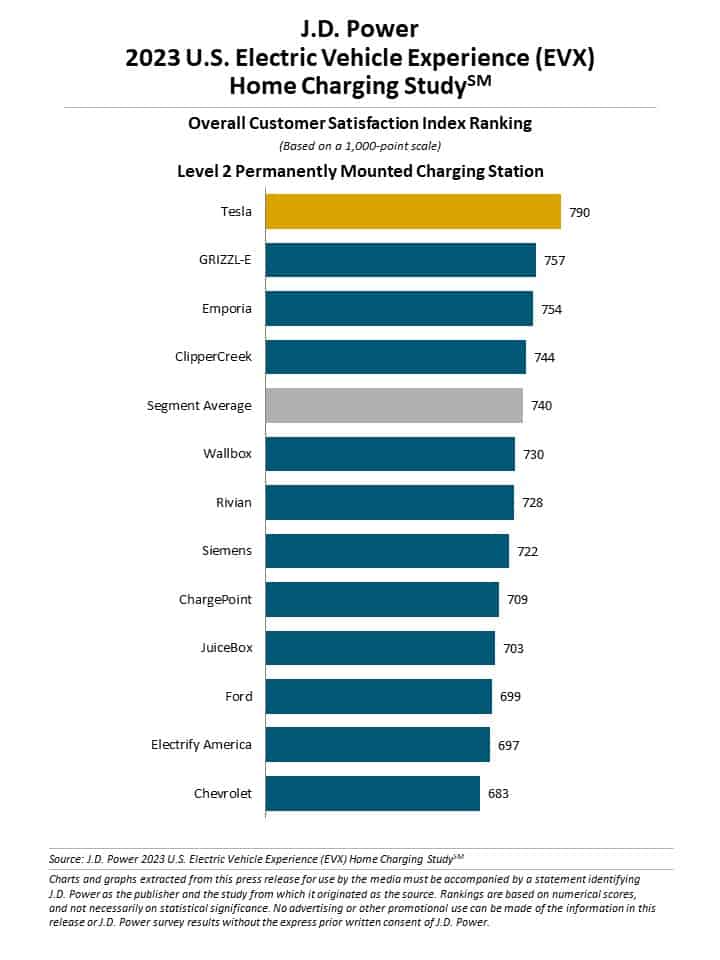
“By increasing awareness of available rebates or incentives, EV owners will benefit. This can snowball into helping potential EV owners make a more informed purchase decision, as well as minimizing home charging concerns and supporting greater EV adoption.”
While Level 2 portable and Level 2 permanently mounted charging stations are utilized by 83% of all users, their satisfaction with the cost of charging declines from the 2022 study by more than 30 points in each segment. Also driving down overall satisfaction in the study is speed for all three home charging segments.2 The 2023 study finds that owners of 2022 and 2023 model EVs are less satisfied with their home charging speed (605 and 597, respectively) than owners of 2021 model EVs (616) and 2020 model EVs (608).
“Whether you’re an automaker, dealer or utility company participating in the EV ecosystem, improving the EV owner experience with respect to home charging should be a common goal shared by all,” said Brent Gruber, executive director of the EV practice at J.D. Power. “There are programs available today that will help EV owners with the startup costs, such as installing or upgrading to a faster Level 2 charger. There are also programs designed to save EV owners money with the ongoing costs of charging their vehicle, like scheduling to charge during the most affordable time of the day. However, J.D. Power sees that there is little awareness and utilization of these benefits. As the EV marketplace continues to grow, brands that help owners take advantage of these offerings will be in a much better position down the road.”
Satisfaction is measured across eight factors: fairness of retail price; cord length; size of charger; ease of winding/storing cable; cost of charging; charging speed; ease of use; and reliability. These factors provide a comprehensive assessment of the owner experience and charger performance.
Following are key findings of the 2023 study:
- As electricity rates increase, educating owners becomes more critical: Just 51% of EV owners say they are knowledgeable about utility company programs for charging their vehicle at home, which is up slightly from 49% a year ago. “Customers are looking to utility companies to help manage rising costs,” said Adrian Chung, director of utilities intelligence at J.D. Power. “By increasing awareness of available rebates or incentives, EV owners will benefit. This can snowball into helping potential EV owners make a more informed purchase decision, as well as minimizing home charging concerns and supporting greater EV adoption.”
- Scheduling charge time increases satisfaction: More than one-third (35%) of owners say they always schedule a time to charge their vehicle at home, while 49% do not use any scheduling. Among those choosing to schedule home charging via an app, satisfaction is highest when using the vehicle mobile app (739) rather than the charger mobile app (706).
- Geography makes a difference with charging satisfaction: Overall satisfaction with Level 2 home charging is lower in all nine regions in this year’s study than a year ago, with New England having the largest decline of 27 points. The Level 2 satisfaction gap between regions is now 96 points (+20 from a year ago), ranging from a low of 689 in the New England region to a high of 785 in the East South Central region.
- Home charging game changer: Satisfaction improves 179 points when moving up from a Level 1 portable charger (561) to a Level 2 permanently mounted charger (740). Across the eight factors in the study, owner satisfaction is higher in seven factors once the switch is made to a Level 2 permanently mounted charger, especially with charging speed (+373 points). A majority (60%) of current Level 1 users say they are likely to upgrade their home charging station to either a Level 2 permanently mounted charger or a Level 2 portable unit.
Study Ranking
The study examines the home charging experience of EV owners across all three charger segments, but only the Level 2 permanently mounted charging station segment is award eligible.
Tesla ranks highest among Level 2 permanently mounted charging stations with a score of 790. GRIZZL-E (757) ranks second and Emporia (754) ranks third. The segment average is 740.
The U.S. Electric Vehicle Experience (EVX) Home Charging Study, now in its third year, is driven by a collaboration with PlugShare, the leading EV driver app maker and research firm. This study sets the standard for benchmarking satisfaction with the critical attributes that affect the total or overall EV home charging experience for both battery electric vehicles (BEVs) and plug-in hybrid electric vehicles (PHEVs). Survey respondents for the study included 13,860 owners of 2017-2023 model year BEVs and PHEVs. The study was fielded from December 2022 through February 2023.
For more information about the U.S. Electric Vehicle Experience (EVX) Home Charging Study, vis